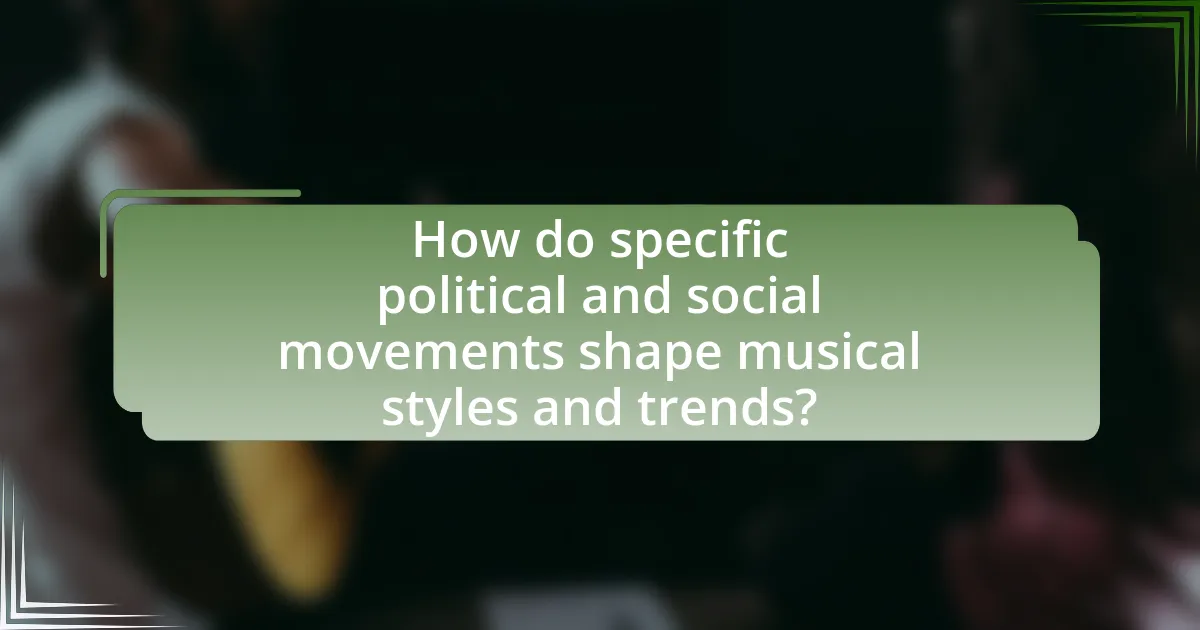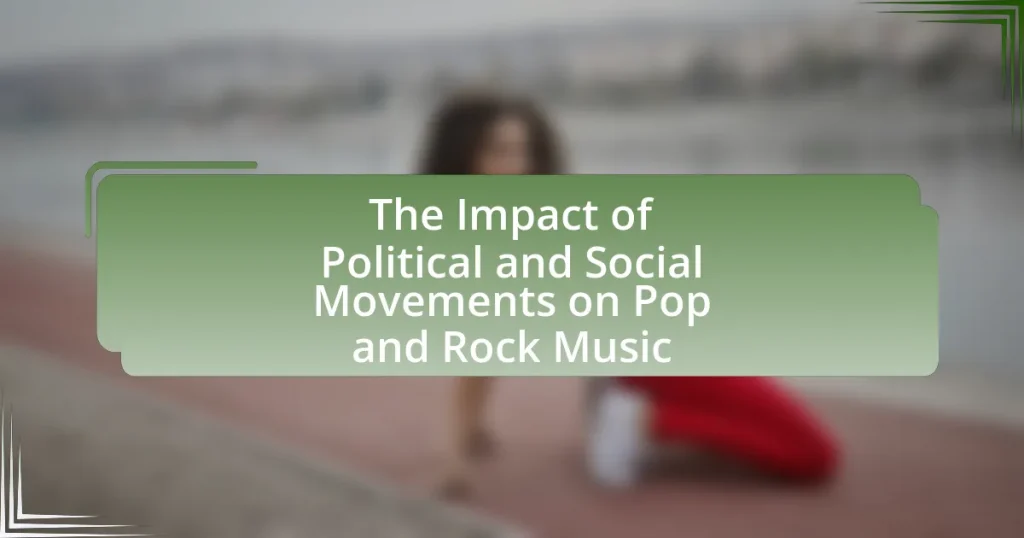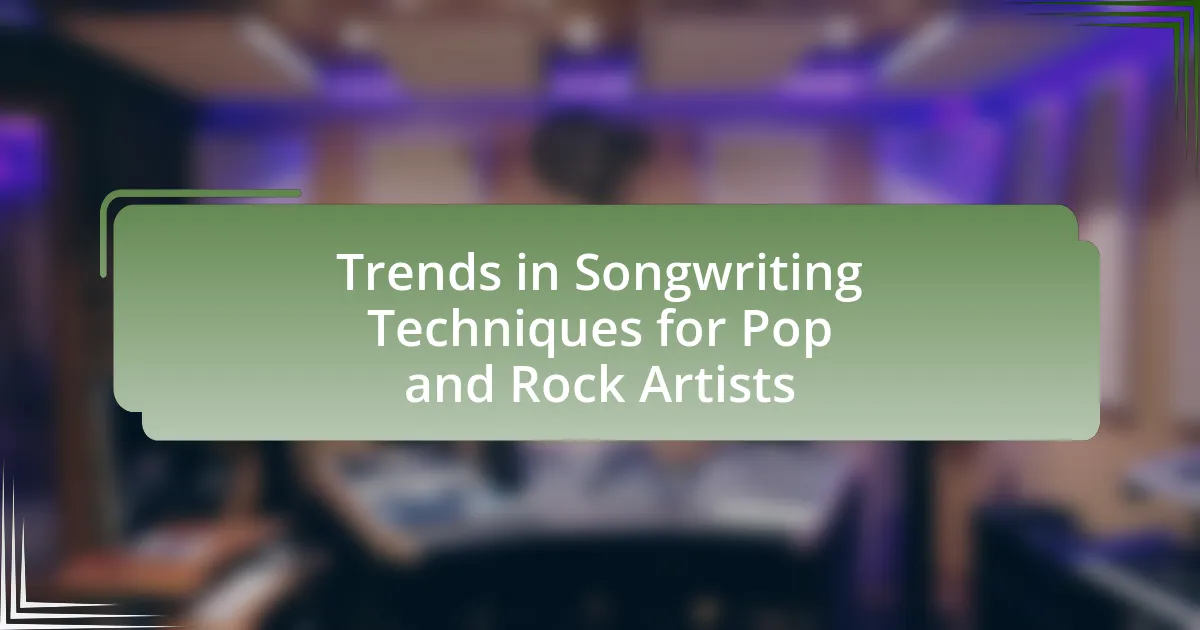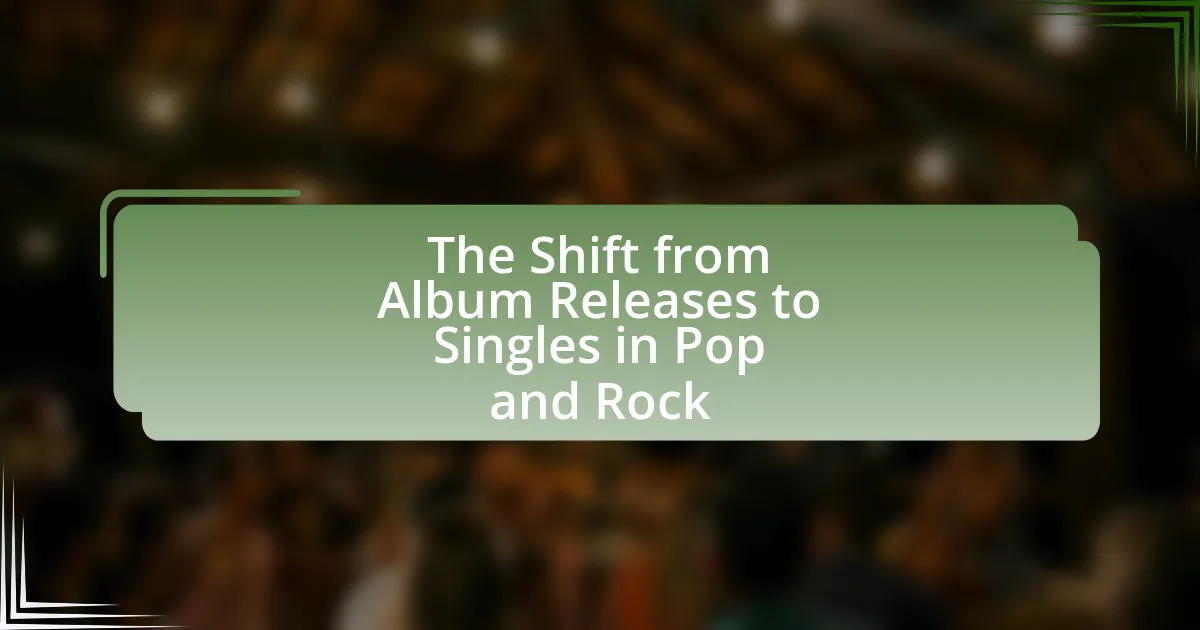The article examines the impact of political and social movements on pop and rock music, highlighting how these movements shape lyrical content, artist activism, and genre evolution. It discusses historical influences, such as the civil rights and anti-war movements, which inspired iconic songs and genres, as well as contemporary movements like Black Lives Matter that continue to inform modern music. Key examples illustrate how artists respond to societal issues through their work, using music as a platform for social change and community mobilization. The article also addresses the challenges artists face in navigating censorship and commercial pressures while advocating for social justice through their music.

What is the Impact of Political and Social Movements on Pop and Rock Music?
Political and social movements significantly influence pop and rock music by shaping lyrical content, artist activism, and genre evolution. For instance, the civil rights movement in the 1960s inspired artists like Bob Dylan and Nina Simone to create songs that addressed social justice and equality, such as “The Times They Are a-Changin'” and “Mississippi Goddam.” Additionally, the anti-war movement during the Vietnam War led to the emergence of protest songs, with artists like Creedence Clearwater Revival and Joan Baez voicing dissent through their music. Furthermore, contemporary movements like Black Lives Matter have prompted modern artists such as Kendrick Lamar and H.E.R. to incorporate themes of racial injustice and empowerment into their work, demonstrating the ongoing relevance of political and social issues in shaping musical expression.
How have political movements historically influenced pop and rock music?
Political movements have historically influenced pop and rock music by shaping the themes, lyrics, and cultural significance of songs. For instance, the civil rights movement in the 1960s inspired artists like Sam Cooke, whose song “A Change Is Gonna Come” became an anthem for social justice. Similarly, the anti-war movement during the Vietnam War led to protest songs such as “Fortunate Son” by Creedence Clearwater Revival, which criticized social inequality and the draft. These examples illustrate how political contexts have driven musicians to address societal issues, thereby embedding political commentary into the fabric of pop and rock music.
What are some key examples of political movements that shaped music genres?
Key examples of political movements that shaped music genres include the Civil Rights Movement, which influenced genres like soul and funk, and the anti-war movement during the Vietnam War, which significantly impacted folk and rock music. The Civil Rights Movement, particularly in the 1960s, saw artists like Sam Cooke and Aretha Franklin use their music to address racial inequality and promote social justice, leading to the emergence of politically charged soul music. Similarly, the anti-war movement galvanized musicians such as Bob Dylan and Joan Baez, whose songs became anthems for peace and protest, thereby shaping the folk and rock genres with themes of resistance and social change.
How did artists respond to political movements in their music?
Artists responded to political movements in their music by creating songs that addressed social issues, advocated for change, and expressed dissent. For example, during the Civil Rights Movement in the 1960s, artists like Sam Cooke with “A Change Is Gonna Come” and Bob Dylan with “The Times They Are a-Changin'” used their platforms to highlight injustices and inspire activism. Similarly, punk rock bands in the late 1970s, such as The Clash, incorporated political themes into their lyrics, critiquing government policies and societal norms. This trend continued into the 21st century, with artists like Kendrick Lamar addressing systemic racism and police brutality in songs like “Alright.” These examples illustrate how musicians have historically engaged with political movements, using their art to reflect societal concerns and mobilize listeners.
In what ways do social movements affect the themes in pop and rock music?
Social movements significantly influence the themes in pop and rock music by shaping lyrical content, inspiring artistic expression, and driving cultural narratives. For instance, the civil rights movement in the 1960s led to the emergence of songs like “A Change Is Gonna Come” by Sam Cooke, which addressed racial injustice and hope for equality. Similarly, the anti-war movement during the Vietnam War inspired tracks such as “Fortunate Son” by Creedence Clearwater Revival, critiquing social inequality and the draft system. These examples illustrate how artists respond to societal issues, using their platforms to reflect and amplify the messages of social movements, thereby embedding these themes into the fabric of pop and rock music.
What social issues have been addressed in pop and rock music over the decades?
Pop and rock music have addressed various social issues over the decades, including civil rights, war, poverty, and mental health. For instance, during the 1960s, artists like Bob Dylan and Joan Baez highlighted civil rights and anti-war sentiments through songs such as “The Times They Are a-Changin'” and “Where Have All the Flowers Gone.” In the 1980s, bands like U2 and Public Enemy tackled issues of poverty and systemic racism, with songs like “One” and “Fight the Power.” More recently, artists such as Billie Eilish and Hozier have focused on mental health and environmental concerns, reflecting contemporary societal challenges. These examples illustrate how pop and rock music have served as platforms for social commentary and activism throughout history.
How do artists use their platforms to promote social change through music?
Artists use their platforms to promote social change through music by addressing social issues in their lyrics, engaging in activism, and leveraging their visibility to raise awareness. For instance, musicians like Bob Dylan and Kendrick Lamar have created songs that highlight civil rights and systemic injustice, effectively using their art to spark conversations and inspire action. Additionally, artists often participate in benefit concerts and social media campaigns, amplifying messages related to causes such as climate change, racial equality, and mental health awareness. The impact of these efforts is evidenced by movements like the Black Lives Matter campaign, which has been supported by numerous artists through music and public statements, demonstrating the powerful role of music in social advocacy.
What role does music play in mobilizing political and social movements?
Music serves as a powerful tool for mobilizing political and social movements by fostering unity, conveying messages, and inspiring action. Historically, songs like “We Shall Overcome” during the Civil Rights Movement and “Give Peace a Chance” during the Vietnam War exemplify how music can encapsulate the sentiments of a movement, rallying individuals around a common cause. Research indicates that music enhances group cohesion and emotional engagement, making it an effective medium for spreading awareness and motivating participants. For instance, studies show that protest songs can increase collective identity and solidarity among activists, thereby amplifying the impact of social movements.
How do anthems and protest songs contribute to movement visibility?
Anthems and protest songs significantly enhance movement visibility by providing a unifying message that resonates with a broad audience. These musical pieces often encapsulate the core values and demands of a movement, making complex social issues more accessible and relatable. For instance, songs like “We Shall Overcome” became synonymous with the Civil Rights Movement, effectively rallying support and raising awareness about racial injustice. The repetitive and memorable nature of such songs aids in their dissemination, allowing them to be sung at rallies, protests, and gatherings, thereby amplifying the movement’s reach. Additionally, the emotional power of music can evoke empathy and solidarity, encouraging individuals to engage with the cause and participate actively. This combination of accessibility, emotional resonance, and communal experience solidifies the role of anthems and protest songs as vital tools for increasing visibility and support for social and political movements.
What impact do music festivals and concerts have on social activism?
Music festivals and concerts significantly enhance social activism by providing a platform for awareness and mobilization around social issues. These events often feature performances that address political and social themes, encouraging attendees to engage with causes such as climate change, racial equality, and human rights. For instance, the 2017 Coachella festival included performances that highlighted the Black Lives Matter movement, demonstrating how artists can influence public discourse. Additionally, festivals like Glastonbury have raised millions for various charities, showcasing their role in fundraising and community support. This intersection of music and activism not only amplifies messages but also fosters a sense of community among participants, leading to increased participation in social movements.

How do specific political and social movements shape musical styles and trends?
Specific political and social movements shape musical styles and trends by influencing the themes, lyrics, and cultural contexts of the music produced. For instance, the Civil Rights Movement in the United States during the 1960s led to the emergence of soul music, with artists like Sam Cooke and Aretha Franklin using their platforms to address racial inequality and social justice. Similarly, the anti-war movement during the Vietnam War inspired folk and rock musicians such as Bob Dylan and Joan Baez to create songs that critiqued government policies and called for peace. These movements not only provided a backdrop for the music but also motivated artists to engage with pressing societal issues, thereby altering the musical landscape to reflect the sentiments and struggles of the time.
What musical styles emerged from specific political movements?
Musical styles that emerged from specific political movements include protest music, punk rock, and reggae. Protest music gained prominence during the civil rights movement in the 1960s, with artists like Bob Dylan and Joan Baez using their songs to advocate for social change and highlight injustices. Punk rock emerged in the 1970s as a response to political disillusionment, characterized by its rebellious attitude and anti-establishment lyrics, with bands like The Clash and Sex Pistols leading the charge. Reggae music, closely associated with the Rastafarian movement and political struggles in Jamaica, became a global symbol of resistance and social justice, with artists like Bob Marley using their platform to address issues of oppression and inequality. These styles reflect the direct influence of political movements on the evolution of music, showcasing how artists respond to and shape societal issues through their work.
How did the Civil Rights Movement influence the development of soul and rock music?
The Civil Rights Movement significantly influenced the development of soul and rock music by infusing these genres with themes of social justice, empowerment, and resistance. Artists like Sam Cooke and Aretha Franklin used their music to address racial inequality and inspire change, exemplified by Cooke’s “A Change Is Gonna Come,” which became an anthem for the movement. Additionally, rock musicians such as Bob Dylan incorporated civil rights themes into their lyrics, broadening the genre’s appeal and aligning it with the struggle for equality. This intersection of music and activism not only shaped the sound of the era but also solidified the role of music as a vehicle for social change, reflecting the cultural and political landscape of the time.
What role did punk rock play in expressing anti-establishment sentiments?
Punk rock served as a powerful vehicle for expressing anti-establishment sentiments by challenging societal norms and critiquing political systems. Emerging in the mid-1970s, punk rock bands like the Sex Pistols and The Clash articulated discontent with government policies, consumerism, and social injustices through their music and lyrics. For instance, the Sex Pistols’ song “God Save the Queen” directly confronted the British monarchy and was seen as a protest against the establishment, leading to significant media attention and public discourse. This genre’s raw sound and rebellious ethos resonated with youth disillusioned by mainstream culture, fostering a sense of community among those who felt marginalized. The DIY ethic of punk also encouraged individuals to create their own art and music, further empowering anti-establishment expressions.
How do social movements influence the evolution of lyrical content in music?
Social movements significantly influence the evolution of lyrical content in music by shaping the themes and messages that artists convey. For instance, the civil rights movement in the 1960s inspired numerous songs that addressed racial inequality and social justice, such as “A Change Is Gonna Come” by Sam Cooke, which became an anthem for the movement. Similarly, the feminist movement has led to the emergence of lyrics that challenge gender norms and advocate for women’s rights, exemplified by songs like “I Will Survive” by Gloria Gaynor. These movements provide a cultural context that encourages artists to reflect societal issues in their work, thereby evolving lyrical content to resonate with contemporary struggles and aspirations.
What are some notable examples of lyrics that reflect social justice themes?
Notable examples of lyrics that reflect social justice themes include “Fight the Power” by Public Enemy, which addresses racial inequality and empowerment, and “Alright” by Kendrick Lamar, which speaks to police brutality and resilience in the Black community. Additionally, “Strange Fruit” by Billie Holiday poignantly highlights the horrors of lynching in America, serving as a powerful protest against racism. These songs have become anthems for various social movements, illustrating the intersection of music and activism.
How do changes in lyrical content reflect societal shifts over time?
Changes in lyrical content reflect societal shifts over time by mirroring the evolving values, struggles, and aspirations of different eras. For instance, during the civil rights movement in the 1960s, artists like Bob Dylan and Sam Cooke used their lyrics to address racial inequality and social justice, exemplified by Dylan’s “The Times They Are a-Changin'” which called for societal change. Similarly, the rise of feminist movements in the 1990s influenced artists like Alanis Morissette and TLC, whose lyrics challenged traditional gender roles and highlighted women’s empowerment. These examples illustrate how lyrical themes adapt to the prevailing social climate, serving as both a reflection and a catalyst for change, thereby validating the connection between music and societal evolution.
What is the relationship between music genres and political ideologies?
Music genres often reflect and influence political ideologies, serving as a medium for social commentary and activism. For instance, punk rock emerged in the 1970s as a response to political disillusionment, with bands like The Clash and Sex Pistols articulating anti-establishment sentiments. Similarly, hip-hop has historically addressed issues of racial inequality and social justice, with artists like Public Enemy and Kendrick Lamar using their platforms to challenge systemic oppression. Research indicates that music can mobilize political movements, as seen in the civil rights movement where songs like “We Shall Overcome” became anthems for change. Thus, the relationship between music genres and political ideologies is characterized by mutual influence, where music both shapes and is shaped by the political landscape.
How do different genres align with specific political beliefs or movements?
Different music genres often align with specific political beliefs or movements by reflecting the values, struggles, and aspirations of those movements. For instance, folk music has historically been associated with social justice movements, as seen in the 1960s when artists like Bob Dylan and Joan Baez used their songs to advocate for civil rights and anti-war sentiments. Similarly, punk rock emerged as a response to political disillusionment in the late 1970s, with bands like The Clash and Sex Pistols expressing anti-establishment views and critiquing government policies. Hip-hop has also served as a voice for marginalized communities, with artists like Public Enemy and Kendrick Lamar addressing systemic racism and inequality. These alignments demonstrate how music genres can serve as both a reflection of and a catalyst for political change, providing a platform for activism and social commentary.
What are the implications of genre-specific activism in music?
Genre-specific activism in music significantly influences social change and cultural identity. This activism often aligns with the values and experiences of particular genres, such as hip-hop addressing racial inequality or punk rock promoting anti-establishment sentiments. For instance, hip-hop artists like Kendrick Lamar have used their platform to highlight systemic racism, leading to increased awareness and dialogue around social justice issues. Additionally, genre-specific activism can mobilize communities, as seen in the punk movement’s role in the anti-globalization protests of the late 1990s, which galvanized youth engagement in political activism. These implications demonstrate how music serves as a vehicle for both personal expression and collective action, shaping societal norms and inspiring movements.
What are the contemporary implications of political and social movements on today’s music scene?
Contemporary political and social movements significantly influence today’s music scene by shaping lyrical content, artist activism, and audience engagement. For instance, movements like Black Lives Matter and climate activism have inspired artists to create music that addresses social justice, equality, and environmental issues, leading to a surge in protest songs and politically charged lyrics. The 2020 release of “I Can’t Breathe” by H.E.R. exemplifies this trend, directly responding to racial injustice and police brutality. Additionally, artists increasingly use their platforms to advocate for change, as seen with Taylor Swift’s vocal support for LGBTQ+ rights and voter registration initiatives. This intersection of music and activism not only reflects societal concerns but also mobilizes listeners, fostering a community of awareness and action around pressing issues.
How are current political movements reflected in modern pop and rock music?
Current political movements are reflected in modern pop and rock music through lyrics, themes, and artist activism that address social justice, inequality, and political dissent. For instance, artists like Billie Eilish and Hozier incorporate messages about climate change and systemic racism in their songs, resonating with movements such as Black Lives Matter and environmental activism. Additionally, the rise of protest songs, exemplified by tracks like “This Is America” by Childish Gambino, highlights issues of gun violence and racial discrimination, directly engaging with contemporary societal challenges. This trend illustrates how musicians use their platforms to amplify political messages and inspire action among listeners.
What are some recent songs that address contemporary political issues?
Recent songs that address contemporary political issues include “This Is America” by Childish Gambino, which critiques gun violence and systemic racism in the United States, and “The Village” by Hozier, which discusses the impact of political oppression and social injustice. Additionally, “Fight the Power” by Public Enemy has been revitalized in recent performances to highlight ongoing racial inequality and activism. These songs reflect current societal challenges and resonate with movements advocating for change, demonstrating the intersection of music and political discourse.
How do artists today engage with social movements through their music?
Artists today engage with social movements through their music by creating songs that address social issues, participating in activism, and using their platforms to raise awareness. For instance, musicians like Billie Eilish and Kendrick Lamar have released tracks that tackle topics such as climate change and racial injustice, respectively. These artists often collaborate with organizations and participate in protests, amplifying their messages through live performances and social media. The impact of their work is evident; for example, the Black Lives Matter movement saw a surge in music that highlighted systemic racism, with artists like H.E.R. and J. Cole contributing powerful anthems that resonate with the movement’s goals. This engagement not only fosters community solidarity but also influences public discourse, demonstrating the significant role of music in social activism.
What challenges do artists face when addressing political and social issues in their music?
Artists face significant challenges when addressing political and social issues in their music, primarily due to censorship, backlash from audiences, and the risk of alienating fans. Censorship can come from record labels, government entities, or social media platforms that may restrict content deemed controversial. For example, in 2019, the Chinese government banned songs by artists like Lady Gaga and Jay-Z due to their political messages. Additionally, artists often encounter backlash from audiences who may disagree with their viewpoints, leading to potential loss of support or sales. The risk of alienating fans is particularly pronounced in genres like pop and rock, where commercial success is closely tied to audience approval. This dynamic creates a complex environment where artists must navigate their creative expression while considering the potential repercussions of their political and social commentary.
How do censorship and commercial pressures impact artistic expression?
Censorship and commercial pressures significantly restrict artistic expression by limiting the themes and messages artists can convey. Censorship, often enforced by governments or regulatory bodies, can lead to the suppression of controversial or dissenting viewpoints, as seen in cases like the banning of music that critiques political regimes, such as the censorship of punk rock in the Soviet Union during the 1980s. Commercial pressures, driven by market demands and the need for profitability, compel artists to conform to mainstream tastes, often resulting in diluted or formulaic content that prioritizes commercial success over creative authenticity. For instance, the music industry frequently favors artists who produce radio-friendly hits, which can stifle innovation and diversity in genres like pop and rock.
What strategies do artists use to navigate these challenges?
Artists employ various strategies to navigate the challenges posed by political and social movements. These strategies include using their music as a platform for activism, engaging in collaborations with like-minded artists, and leveraging social media to amplify their messages. For instance, musicians like Bob Dylan and Kendrick Lamar have historically addressed social issues through their lyrics, effectively raising awareness and prompting discussions. Additionally, artists often participate in benefit concerts or movements, such as Live Aid or Black Lives Matter, to unite their audiences around a common cause, demonstrating the power of collective action in the music industry.
What can listeners learn from the intersection of music and social activism?
Listeners can learn that music serves as a powerful tool for social activism, amplifying messages of change and mobilizing communities. Historical examples include songs like “Fight the Power” by Public Enemy, which became an anthem for the civil rights movement, illustrating how music can inspire collective action and raise awareness about social injustices. Additionally, the impact of artists like Bob Dylan, whose song “The Times They Are a-Changin'” resonated during the 1960s counterculture, demonstrates how music can reflect and influence societal values and political discourse. Through these examples, listeners can understand the role of music in shaping public opinion and fostering social movements.
How can music inspire action and awareness in social movements?
Music can inspire action and awareness in social movements by serving as a powerful tool for communication and emotional connection. Through lyrics that resonate with social issues, music can articulate the struggles and aspirations of marginalized communities, fostering a sense of solidarity and urgency. For instance, songs like “Fight the Power” by Public Enemy and “Alright” by Kendrick Lamar have become anthems for movements such as Black Lives Matter, effectively mobilizing individuals and raising awareness about systemic injustices. Research indicates that music can enhance group cohesion and motivate collective action, as demonstrated in studies showing that protest songs increase participation in demonstrations and rallies.
What role does music play in fostering community and solidarity among activists?
Music plays a crucial role in fostering community and solidarity among activists by serving as a unifying force that amplifies shared messages and emotions. Through collective singing and rhythmic participation, music creates a sense of belonging and strengthens social bonds among individuals engaged in activism. Historical examples, such as the civil rights movement in the United States, illustrate this phenomenon; songs like “We Shall Overcome” became anthems that not only inspired participants but also connected diverse groups under a common cause. Research indicates that music can enhance group cohesion and motivate collective action, as seen in studies on protest songs and their impact on mobilization efforts.




